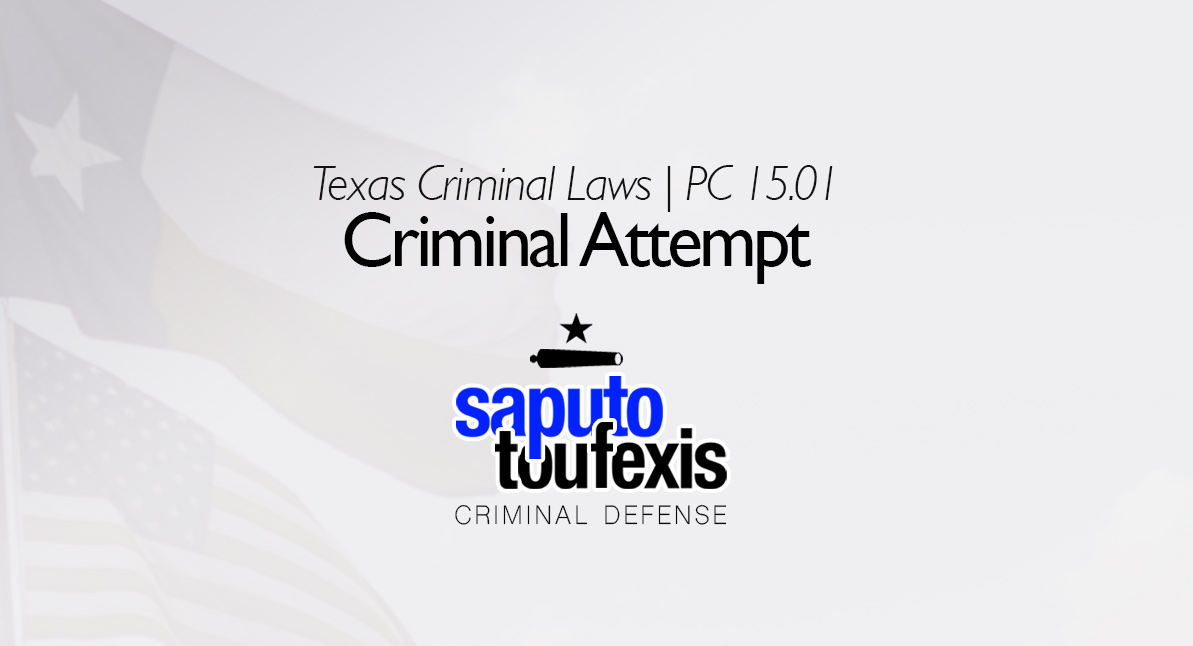The Texas Criminal Attempt law gives police the right to arrest you if they believe you tried to commit a crime but the offense that you tried to commit was never completed.
FAQs about the
Criminal Attempt law in Texas
- What is the current Texas law about Criminal Attempt?
- How can I be charged with a Criminal Attempt offense in Texas?
- What is the statute of limitation for Criminal Attempt in Texas?
- What is the penalty for a Texas Criminal Attempt offense?
- Can you get probation for Criminal Attempt in Texas?
- Do I have to register as a sex offender in Texas if guilty of Criminal Attempt?
- What level of crime is Criminal Attempt in Texas?
In order to charge someone with a violation of the Criminal Attempt law, the state must couple it with some other offense. For instance, when the state charges someone with “Attempted Murder,” the offense is classified as a violation of Penal Code Section 15.01, Criminal Attempt. Whenever you see “attempted” in the offense name, you will know that it’s a Criminal Attempt offense.
Have you been charged with Criminal Attempt? Book a consultation to discuss legal representation with attorneys Paul Saputo and Nicholas Toufexis today.
Criminal Attempt always requires the “specific intent” to commit the underlying crime. In addition, the state has to prove more activity than mere “preparation.”
The Texas legislature codified this criminal offense in Texas Penal Code Section 15.01. The law was not updated in 2023. In fact, this law has not been amended since 1993.
The Penal Code classifies the Texas Criminal Attempt law under Title 4 “Inchoate Offenses,” Chapter 15 “Preparatory Offenses.” Learn more about the Texas offense of Criminal Attempt below.
What is the current Texas law about Criminal Attempt?
Texas law currently defines the offense of Criminal Attempt in Penal Code Section §15.01 as follows:[1]
(a) A person commits an offense if, with specific intent to commit an offense, he does an act amounting to more than mere preparation that tends but fails to effect the commission of the offense intended.
(b) If a person attempts an offense that may be aggravated, his conduct constitutes an attempt to commit the aggravated offense if an element that aggravates the offense accompanies the attempt.
How can I be charged with a Criminal Attempt offense in Texas?
In order to convict you of Criminal Attempt, the state must prove each of the elements of 15.01(a) as described in the section above. In addition, you can be charged with an aggravated offense if “an element that aggravates the offense accompanies the attempt.”
The state can also charge you with Criminal Attempt if you actually completed the commission of the crime – the statute states specifically that “It is no defense to prosecution for criminal attempt that the offense attempted was actually committed.”[2] Because of this, sometimes people plea to Criminal Attempt of a crime that they were initially charged with committing as part of a plea bargain agreement.
What is the statute of limitation for Criminal Attempt in Texas?
The limitation period for Criminal Attempt is the same as that of the offense attempted.[3]
What is the penalty for a Texas Criminal Attempt offense?
Whenever the state charges an offense as attempted, the classification level drops one grade.[4] For instance, since Murder is a first degree felony, Attempted Murder is a second degree felony.
First degree felonies drop to second degree felonies. Second degree felonies drop to third degree felonies. Third degree felonies drop to state jail felonies. State jail felonies drop to Class A misdemeanors, and so on.
Can you get probation for Criminal Attempt in Texas?
The Texas Code of Criminal Procedure allows both judges and juries to grant probation for Criminal Attempt, and judges are also allowed to accept deferred adjudication plea deals.[5]
Note, however, that no matter the offense, neither judges nor juries may recommend community supervision for any suspended sentence of over 10 years.[6] Also, judges may not grant community supervision after a conviction if (1) the defendant used or exhibited a deadly weapon during the commission of the felony or immediate flight thereafter and (2) the defendant used or exhibited the deadly weapon himself or was a party to the offense and knew that a deadly weapon would be used or exhibited.[7]
Do I have to register as a sex offender in Texas if guilty of Criminal Attempt?
Any conviction or adjudication, including deferred adjudication, for an Attempted Texas offense that would require registration if the offense had been completed, requires registration as a sex offender, except for Attempted Indecent Exposure and Attempted Online Solicitation of a Minor.[8]
What level of crime is Criminal Attempt in Texas?
The punishment for attempted offenses in the code ranges from a Class C misdemeanor to a second degree felony.
Learn more about the penalty range for this offense in the section above.
Legal References:
^1. Texas Penal Code §15.01. This law is current as of 2024.^2. Texas Penal Code §15.01(c)^3. Code of Criminal Procedure 12.03(a)^4. Texas Penal Code §15.01(d)^5. See Chapter 42, Texas Code of Criminal Procedure, Art. 42A.054, Art. 42A.056, Art. 42A.102 .^6. Art. 42A.053(c), Texas Code of Criminal Procedure^7. Art. 42A.054(b), Texas Code of Criminal Procedure^8. Code of Criminal Procedure, Article 62.001(5)(G)







